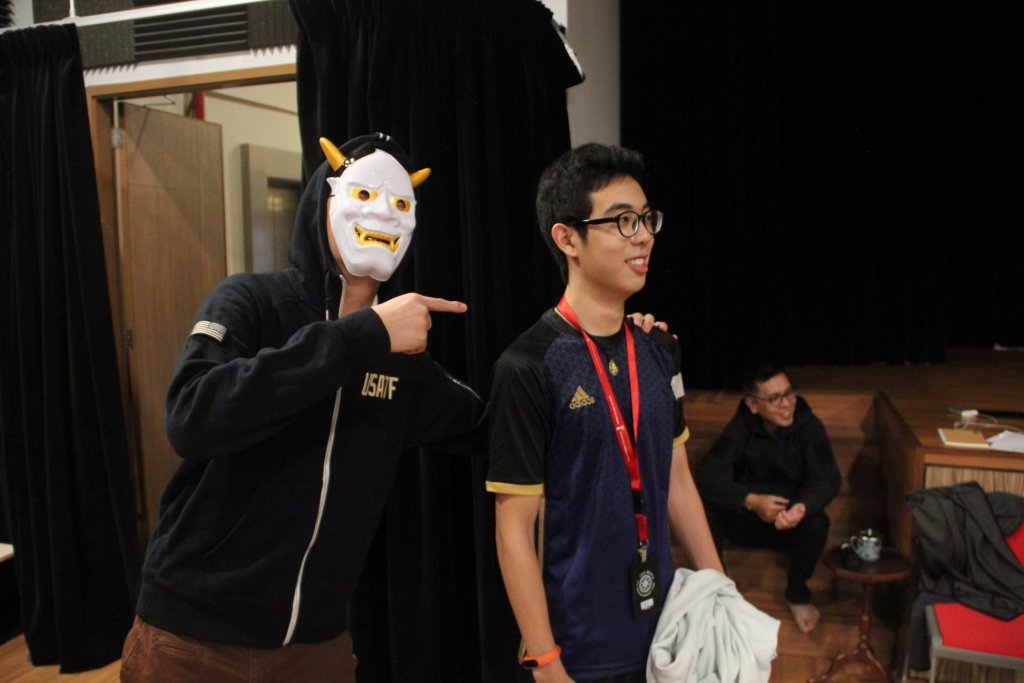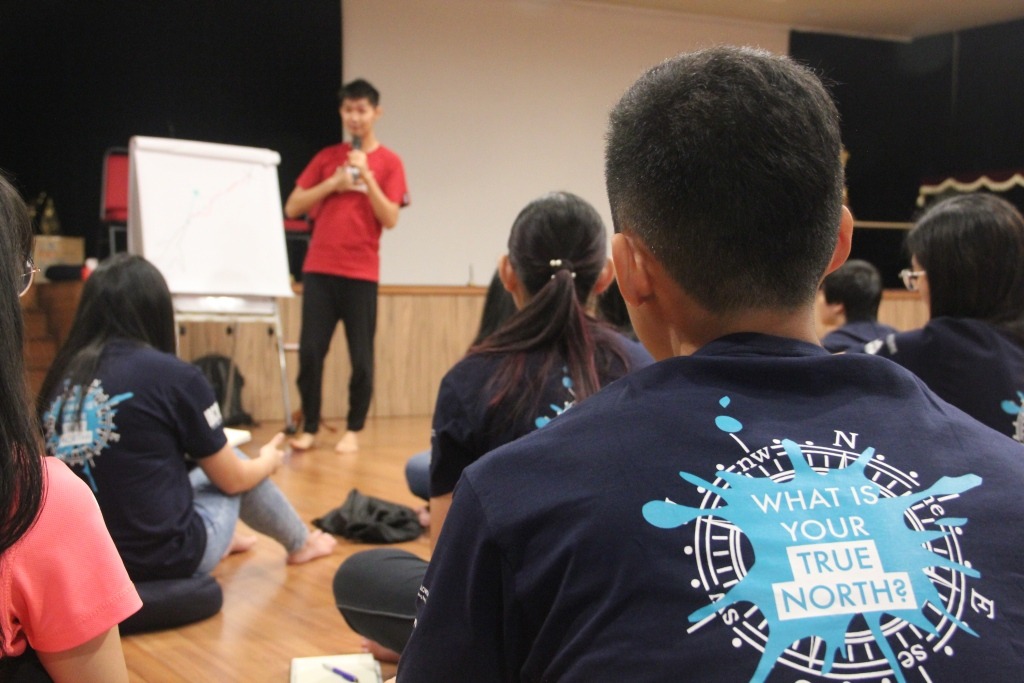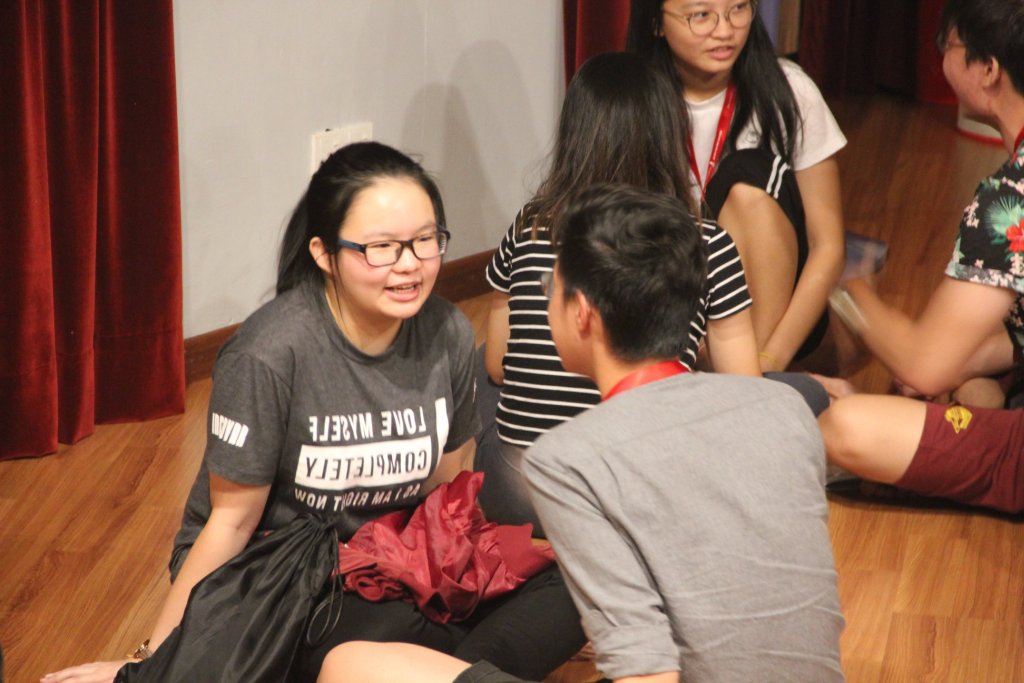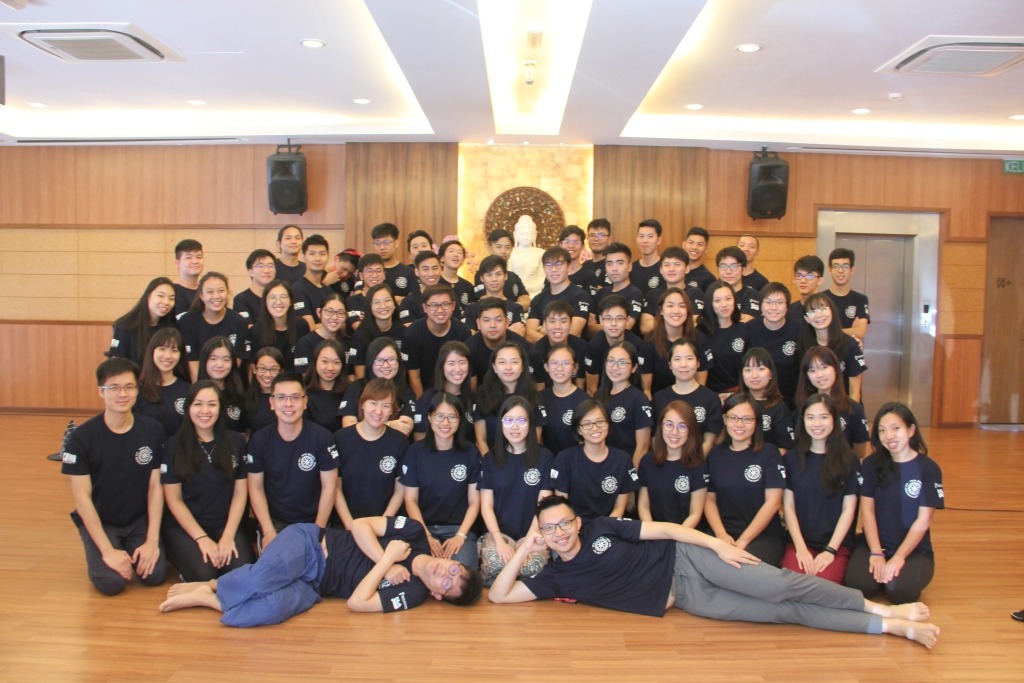by Bryan Phang

Who am I? What do I want? What am I doing with my life? Am I happy? These are among the most common questions people ask themselves, including me. I was always a person who loves attention and expressing myself. I am a people person, I like to amuse and entertain my friends with jokes and playfulness because their laughter gives me a feeling of happiness. Similarly, if others are feeling down, angry or having any hatred towards me, it can bother me for a long time. I love Dhammaduta work, not because it gives me good karma but it is a passion I am unable to explain. These were what I thought I wanted in life, but do I really want that?
I was told Incovar Dhamma Camp is one of the most influential and meaningful camps for people of my age group. I have been eager to register for Incovar Dhamma Camp for many years, but the past camps had always clashed with my studies. This year, I made sure I cleared my schedule and signed up early so I wouldn’t miss it again. My parents weren’t too happy because my semester had just started, but I knew very well that I do not want to miss another year of Incovar Dhamma Camp.

The theme of the camp, True North, frankly I did not understand what it meant at all. I only assumed it has something to do with knowing the direction of your life, which was not exactly wrong. Little did I know, True North became a short journey in my life I will cherish forever. Throughout the whole camp, the committees emphasized on loving yourself, being aware of your feelings, your thoughts and discovering yourself. It might sound easy but loving yourself can be a pretty hard task sometime; At least that was how I felt in camp. I would like to share the most impactful moments and lessons I brought home from this camp.
Imagine two cups. For one cup to fill the other cup, that cup must first overflow with water. This is an inspiring quote by one of the guest speakers in camp. For you to love others, you must love yourself first. Much like the cup, you must overflow yourself with love for you to give love to your friends, family and others. Sometimes I take my feelings for granted because I like to satisfy and entertain others. However, this makes whatever I do for others meaningless as it does not entertain myself. If I am not happy, how do I make others happy? How do I love them if I myself do not feel loved? This taught me a lesson, which is to be aware of my own feelings and be sure to love myself before I take any action to love others.
People believe in different truths.Everyone seeks happiness, just in different forms.
These two simple but beautiful quotes above came from two different Dhamma speakers, on two different topics. Despite coming from different topics, the quotes are very much related to each other.
The first topic was “The Absolute Truth” by Brother Tan Siang Chye. My main takeaway from Brother Tan’s talk was that everyone has their own truth. This simply means everyone believes in different things. Take religion for an example, we Buddhists believe in the Buddha, Dhamma and Sangha. The Christians, Muslims, Hindus believe in their respective deities. Every religion has their own truth. Even as Buddhists ourselves, we have different types of Buddhism such as Theravada, Mahayana, Tibetan and more. If there is only one Dhamma, why are there so many types of Buddhism? We create our own truth, our own reality. Other sayings which contradicts your truth creates unhappiness and anger. Therefore, we must learn to accept others’ truth with an open heart, even if it contradicts ours; Most importantly, do not be afraid of change our truth if we feel the need to. To link this topic with happiness, I strongly believe that as long your truth brings happiness to yourself, that is a truth to live by. The Dhamma is a good example of a truth. The Dhamma was Buddha’s truth, which we Buddhists practice because we believe that is the absolute truth of happiness. We adopted the truth of Dhamma because we believe it truly guides us to live a happy life; Other religions think otherwise. Your truth defines who you are, no one should ever be able to install it in you, but instead guide you towards it. That is the only way you can truly discover yourself.
The second quote came from the topic “Hindrances in Achieving True North and How to Eliminate them in Terms of Buddhist Teaching” by Uncle Vijaya. This Dhamma talk included The Three Evil Roots and The Four Brahma Viharas. The three evil roots, which are greed, hatred and ignorance are represented by a rooster, snake and boar respectively in the Wheel of Life.

These are called the evil roots because they bring unhappiness, anger and negativity in our lives. Also, notice how the three animals are all biting each other’s tails and forming a circle? This is because the evil roots are all related. Experiencing one of the evil roots will eventually lead us to the other evil roots. The main challenge is how can we eliminate the evil roots and feel happy? The answer is simple, the Four Brahma Viharas, which are Metta, Karuna, Upekkha and Mudita. Metta means loving kindness; Karuna means compassion; Upekkha means equanimity; Mudita means sympathetic joy. Also, the Noble Eightfold Path which includes Right View, Right Intention, Right Speech, Right Action, Right Livelihood, Right Effort, Right Mindfulness and Right Concentration. The Noble Eightfold Path guides us to take every action or carry out every task with the right mindset. The word “right” before each practice explains that there is no need for too much or too less of that practice; Just the right amount will be sufficient. According to the Dhamma, the Four Brahma Viharas and Noble Eightfold Paths are one of the best ways to eliminate the evil roots and bring happiness in our lives. Then again, this is a truth of the Buddha and Buddhists. Many people have their own ways of achieving happiness and there is simply nothing wrong with any of them. Why do some people work hard to earn so much money? Why do some people quit their jobs to travel? This is because some believe that money is the key to happiness, some do not believe so. Ultimately, everyone is seeking for happiness, just in different ways.
(Fun fact: The Noble Eightfold Path symbol resembles the True North symbol of camp)
Another small but impactful takeaway from Uncle Vijaya was (not his exact words) “Some people believe there is a heaven and a hell. We as Buddhists say we don’t know if there is a heaven or a hell. No one can tell you where exactly Nirvana is. Even if you type “Nirvana” in Waze it will only take you to Shah Alam! What if there is no heaven? What if there is no hell? Then you are wasting your life doing everything you do just to get good karma! Buat apa? Live in the present moment. We are responsible in making our own heaven and hell. If we feel happy, we are already in heaven! If we are feeling sad, depressed or any forms of suffering, then we are in hell.”

Lastly, I would like to highlight a new mission I received from camp. This mission was given to me by myself, a Personal Mission Statement. A personal mission statement is an ultimate goal we set for our own lives. After some brainstorming session and activities, we were all given some time to write our own personal mission statement. I knew mine was very clear and easy, this had always been my objective in life. My personal mission statement is “To bring positivity, happiness and Dhamma to people around me”. A very simple and straightforward mission, but a very hard one to live by. As mentioned before, if we do not know if there is a heaven or hell, why not bring the heaven to our lives? I want to also bring happiness to others, by emitting a radiation of metta and positivity which comes from within. That is my True North. I needed this Personal Mission Statement to always remind myself why am I doing everything I do and what do I want to achieve from every action I take.
These are merely half of the lessons I brought home from camp, there are many more but I might have to take up at least 10 pages for that. But before I end my sharing, I would like to share about how Incovar Dhamma Camp and Buddhism affected my life. After the camp, I became more confident, cheerful and positive in living my life. I had a beautiful necklace given to me earlier this year on Wesak Day. I wore the necklace every day to remind myself to be a good Buddhist. Not too long ago, the necklace slipped off my hand, fell on the floor and a part of it broke.
To my surprise, instead of feeling sad that my favorite necklace just broke, I simply said “Oh no!” and smiled right after. I did not feel sad that the necklace was broken, but I felt happy remembering the necklace had brought me many good memories. There was no attachment there, only beautiful memories. This reminded me of a saying by the late Ajahn Chah “When I know the glass is already broken, every minute with it is precious”. I did not regret breaking it, because I was very sure I cherished every moment with it.

I will never stop being who I was before I went to IDC 41: True North. This camp did not change my attitude or personality, but my mindset. This camp guided me to understand and love myself, not to change who I am. I will cherish the life-changing journey I had in camp for as long as I live because it was the moment I started loving and understanding myself a lot more. I would like to end my sharing with a few personal quotes which inspired me in every aspect of my life.
As long your truth brings happiness to yourself, that is a truth to live by
Your truth defines who you are, no one should ever be able to install it in you, but instead guide you towards it
A mistake or regret can be a lesson, but there is no need to be emotionally attached to lessons
Life is too short, no time to live in regrets
You do not need to force yourself to be positive in negative situations, you just need to practice, and the positivity comes naturally
The Dhamma is a guide to happiness, not some rules to live by. If you live by the Dhamma with the wrong mindset, then you will receive the wrong outcome
Legends start from small beginnings
Jackie Underwood
All the quotes above are my own personal quotes except the last one

A huge shout out to the beloved camp committees and facilitators from Buddhist Gem Fellowship Youth Connection, Brother Tan Siang Chye, Uncle Vijaya, Brother Jackie Underwood, guest speakers of “Cindy’s talk show” and every participant who went to the camp with me. I am very honored and pleased to have all of you to guide me to discover and love myself. Without you, camp would not have been such a memorable journey! Thank you for being part of such a wonderful personal journey to discover myself. Love you all! A big thank you to Buddhist Gem Fellowship as well for opening more Dhamma doors to young people like us to learn, investigate and experience the Truth for ourselves.
